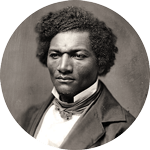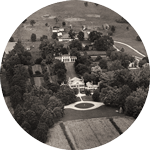- December 16, 2016
- By Liam Farrell
 Abolitionist Frederick Douglass is one of the most studied figures in American history, but the culture made by Europeans and African Americans where he lived on the Eastern Shore has not been described until now.
Abolitionist Frederick Douglass is one of the most studied figures in American history, but the culture made by Europeans and African Americans where he lived on the Eastern Shore has not been described until now.
UMD anthropologists who excavated Wye House plantation outside Easton, Md., for 10 years share their findings on its cuisine, use of the natural environment and religion in a new exhibit at Hornbake Library, “Frederick Douglass & Wye House: Archaeology and African American Culture in Maryland.”
“I’m interested in what Douglass does not deal with (in his writings),” says anthropology Professor Mark P. Leone, who curated the exhibit with former and current graduate students. “It is the world that blacks and whites made together.”
By highlighting discoveries such as animal bones, cookbooks and pollen, the exhibit, running through July 2017, shows the evolution of Maryland cooking and the role of plants in healing practices.
 The most important artifacts on display are a set of circles made from objects like crushed tobacco cans, the bottom of a glass jug and a wheel, likely from a small cart or barrow. Leone believes these objects are evidence of how traditional African religious beliefs began to blend with Christianity in the 19th century, particularly as the Biblical image of Ezekiel’s wheel became a key part of the African Methodist Episcopal church.
The most important artifacts on display are a set of circles made from objects like crushed tobacco cans, the bottom of a glass jug and a wheel, likely from a small cart or barrow. Leone believes these objects are evidence of how traditional African religious beliefs began to blend with Christianity in the 19th century, particularly as the Biblical image of Ezekiel’s wheel became a key part of the African Methodist Episcopal church.
“The circles and the wheel are one of the vehicles that show how Africans became convinced Christians,” Leone says. “This wheel in the context of this set of objects is unique.”
Located in the Maryland Room Gallery on the first floor of Hornbake Library, the exhibit is open Monday through Saturday, 9 a.m. to 5 p.m.
